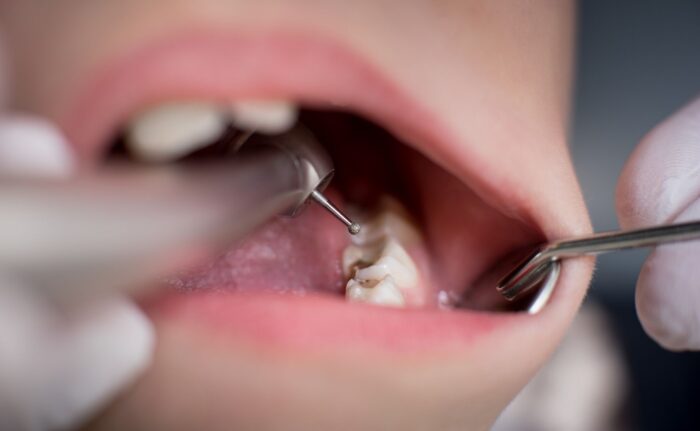Cavities are a common oral health issue. In fact, nearly one in three adults will have a cavity at some point in their life. We may think of cavities as a children’s issue, but no one is immune. These spots of decay can cause pain, discomfort, and damage to your teeth. The good news is that cavities are largely preventable. With the right oral hygiene, you can increase your odds of avoiding cavities.

Maintaining a Consistent Oral Hygiene Routine
Regular brushing is crucial for preventing cavities. Make sure to brush your teeth at least twice a day using fluoride toothpaste. Fluoride helps strengthen tooth enamel. This mineral makes your teeth more resistant to acid attacks and tooth decay. Furthermore, you should use a soft-bristled toothbrush to protect your enamel. Finally, you should brush all surfaces of your teeth using gentle circular motions for about two minutes each time.
Brushing alone is not enough to remove plaque and food particles from between your teeth. That’s where flossing comes in. Flossing once a day helps clean those hard-to-reach areas. It is necessary to prevent plaque buildup and reduce the risk of cavities and gum disease. When you floss, take your time and be thorough. You don’t want to miss any sides of your teeth.
Limiting Sugar
Sugar is one of the main culprits behind cavities. When you consume sugary foods and drinks, the bacteria in your mouth feed on the sugars and produce acids that attack tooth enamel. As a result, you should limit sugary snacks, sodas, juices, and sweets. It is better to opt for healthier choices like fruits, vegetables, and water.
Frequent daily snacking exposes your teeth to a continuous acid attack, increasing the risk of cavities. Try to limit snacking and choose tooth-friendly options. If you do indulge in a snack, brush your teeth afterward or rinse your mouth with water. This will minimize the effects of acid.
Promoting a Tooth-Friendly Diet
A diet rich in calcium is beneficial for strong and healthy teeth. Calcium helps remineralize tooth enamel. This will help make your teeth more resistant to decay. Include calcium-rich foods, such as milk, cheese, yogurt, leafy greens, and almonds, in your diet.
Vitamin C is essential for healthy gums and strong teeth. It also helps promote collagen production, which supports the integrity of the gums and helps fight gum disease. Incorporate foods like citrus fruits, strawberries, bell peppers, and broccoli into your meals to boost your vitamin C intake.
Drinking fluoridated water is an effective way to protect your teeth from cavities. Fluoride in water helps strengthen tooth enamel and reduce the risk of tooth decay. If your tap water does not contain fluoride, consider using a fluoride mouthwash.
Regular Dental Care
Regular dental check-ups and cleanings are crucial for cavity prevention. Visit your dentist every six months for a full oral exam. During these visits, your dentist will detect early signs of tooth decay with X-rays. They will also provide professional cleanings to remove plaque and tartar. Here, they will give advice for maintaining optimal oral health.
